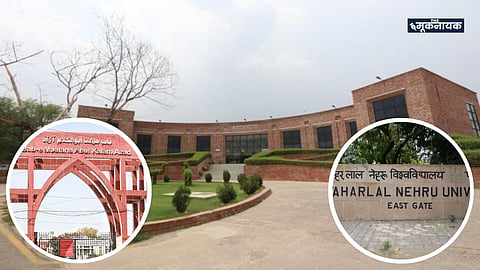
New Delhi— In a significant development reflecting India’s tightening stance on national security, two of the country’s premier universities—Jamia Millia Islamia (JMI) and Jawaharlal Nehru University (JNU)—have announced the suspension of their academic partnerships with Turkish institutions.
On May 15, Jamia Millia Islamia declared through its official social media handle on X (formerly Twitter):
“Due to national security considerations, any Memorandum of Understanding (MoU) between Jamia Millia Islamia, New Delhi, and any institution affiliated with the Government of the Republic of Türkiye stands suspended with immediate effect, until further orders. Jamia Millia Islamia stands firmly with the Nation.”
This announcement comes just days after Jawaharlal Nehru University, one of India’s top research universities, made a similar move. On May 14, JNU posted:
“Due to National Security considerations, the MoU between JNU and Inonu University, Türkiye stands suspended until further notice. JNU stands with the Nation.”
These developments signal a broader realignment of India’s academic diplomacy in response to evolving geopolitical concerns. While neither university elaborated on the specific security issues involved, the use of the term "national security considerations" suggests that intelligence or policy-level assessments have played a decisive role.
Over the past two decades, Indian universities have expanded global academic collaborations to boost research and cultural exchange. Türkiye, with its growing higher education sector, has emerged as a partner of interest for several Indian institutions. However, shifting diplomatic equations and international security dynamics now appear to be influencing even the academic sector.
Sources within the academic community indicate that the government may be reviewing MoUs signed with universities in countries where strategic interests do not align or where activities seen as contrary to India’s national interest are suspected.
Both universities emphasized their solidarity with the nation, a notable statement in an academic setting traditionally viewed as autonomous. Observers say this reflects the increasing overlap between academia and national strategic thinking.
What happens next remains to be seen. The suspensions are described as "until further orders," suggesting they may be lifted if circumstances change. However, for now, student exchange programs, joint research initiatives, and collaborative seminars with Turkish partner institutions will be put on hold.
As India recalibrates its foreign policy amid global tensions, universities—often seen as soft power bridges—are being drawn into the orbit of hard power concerns. The recent decisions by Jamia Millia Islamia and JNU underscore that in today’s world, even classrooms are not untouched by geopolitics.
You can also join our WhatsApp group to get premium and selected news of The Mooknayak on WhatsApp. Click here to join the WhatsApp group.